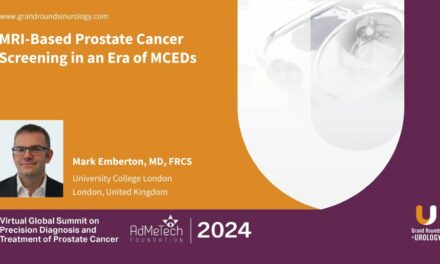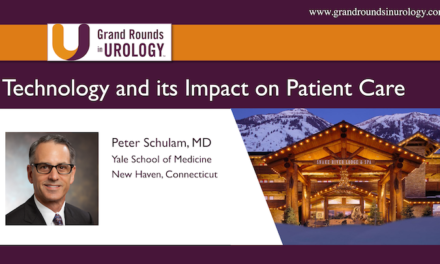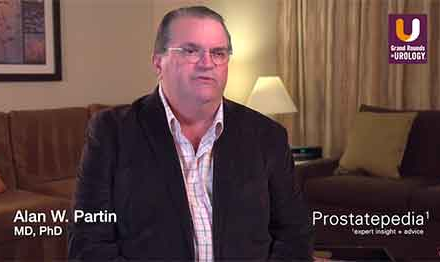Dr. E. David Crawford presented “Testosterone and the Prostate” at the 26th Annual Perspectives in Urology: Point-Counterpoint, November 10, 2017 in Scottsdale, AZ
How to cite: Crawford, David “Testosterone and the Prostate” November 10, 2017. Accessed Dec 2025. https://grandroundsinurology.com/identifying-toothless-lions-prostate-cancer/
Summary:
In the first part of the Point-Counterpoint debate on whether or not testosterone treatment is safe and effective, Dr. E. David Crawford, MD, argues that testosterone treatment has beneficial effects for multiple systems and that it’s safe to use with appropriate medical monitoring.
View Dr. Ryan P. Terlecki’s Counterargument on Testosterone Therapy
Testosterone and the Prostate
Transcript:
People ask, why are you interested in testosterone replacement therapy because I mostly do prostate cancer. Well that’s why I got interested in it because of the controversies about prostate cancer and listening to the discussions and the concerns and trying to dig to the bottom of if there really a risk of prostate cancer or progression of BPH in men that are receiving testosterone replacement therapy.
I really didn’t try to get into all the discussions about sort of the pros and cons of the various testosterone levels, and assays and ways to look at symptomatology. There’s also an overlap that exists with this and androgen deprivation therapy, because there’s a lot of similarities that exist, cardiovascular wise and things like this. So the title of my talk is testosterone and the prostate.
We have two ARS questions. Men with low T when diagnosed with prostate cancer have a lower Gleason score. Is that true; false; or you’re unsure.
Alright, the answer is false. That’s what people think. Alright, we’ll see if that changes.
Next one. Testosterone replacement therapy, TRT, has been shown to flare prostate cancer in men on active surveillance. Yes; no; or you’re not sure?
Alright. And the survey says, most people say no. Alright.
So if we look at testosterone treatment, TRT, there’s a lot of really well known benefits probably increase in sexual interest, erectile function, muscle strength, decreased central fat, bone density, and improved cognition. There’s other ones that aren’t so well accepted including mood, well-being, physical performance/activity, decreased fractures, quality of life, and life expectancy. And then there’s the down side, the potential risk.
I would say that the one that gathers the most interest here is the increased risk and severity of prostate cancer. We may have–and again these are all not really proven, exacerbation of BPH, polycythemia, that’s one of the relatively known side effects. It could make sleep apnea worse, fluid retention, coronary artery disease, gynecomastia–an imbalance erasing testosterone, it’s aromatized to estrogens, and that may affect estrogen receptors in the breast and lead to gynecomastia–priapism, and acne. But the one that is a major concern is the increased risk and severity of prostate cancer and I would also say the potential for cardiovascular disease.
So it’s sort of the all these vicious circles here, low testosterone, metabolic syndrome. Is prostate disease worse or better? Is prostate cancer, if you’re diagnosed with low T, worse, better, indifferent? All these things are out there to think about.
What are some of the questions, testosterone substitution and possible changes in the prostate. One, does it increase PSA levels? We’ll talk a little bit about that. There’s probably some evidence that it does and people say it increases it up to what the normal range would be for a ugonadal person at that level. Does it increase prostate volume? Perhaps yes. Again the same sort of thing. And does it stimulate growth in previously undiagnosed prostate cancers? Well that is one of the major concerns out, but there’s no data to support that testosterone substitution as a cause of prostate cancer. And I think we’ve all seem men that have gone on TRT, whose PSA goes up a little bit, and they’re found to have prostate cancer. Actually, we may be doing them a favor. We may not have diagnosed that. We know that in a lot of studies there have been subtle changes in the AUA symptom score and things like that, and we know that in lots of cell lines that when you administer testosterone, that it’s a stimulant, it’s a mitogenic that makes the caner grow. But again the underlying thing here is does it cause prostate cancer and I don’t think there’s any data to support that, we’ll go through it.
So prostate, we know that prostate development, not prostate cancer, differentiation, and maintenance are known to be closely linked with bioavailability of testosterone and other sex related hormones. We know that a group of men born in the Dominican Republic who were deficient in 5-alpha reductase did not develop in prostate disease. They had a lot of favorable characteristics like lack of acne, did not lose their hair, did not get BPH and that was the basis as you well know for 5-alpha reductase inhibitors. But we do know that you do need testosterone and you do need dihydrotestosterone for prostate development, growth and so forth.
Along came Huggins and Hodges in 1941, and they won a Nobel prize in ’56 for discovering, not really discovering but for the first time reporting that deprivation of testosterone slowed the progression of prostate cancer and they were optimistic initially. It was sort of like Lazarus and a cure, is that men were riding on pain in bed with metastatic prostate cancer. They were treated with deprivation therapy of testosterone through various mechanisms, and they sort of got up and walked. And we thought, wow, we’ve got a cure for the disease.
But their concern exist that testosterone’s risk of converting an occult caner into a clinical cancer. Because we know, basically we’ve heard all this that if you live long enough you’re going to get prostate cancer, if you examine prostates, autopsies, Wyle Soca [phonetic] did this years ago, it was done by Barnes in the UK that there was microscopic prostate cancer that increased with age. And this is this throwing gasoline on the fire, making things worse by adding testosterone, which always bothered me, because most men that we take care of with prostate cancer have normal T levels. And maybe the ones that have low T levels are disadvantaged and I’ll talk about that.
So this is sort of the hypothesis if castration makes prostate cancer cells die, then shouldn’t raising testosterone make prostate cancer cells grow? So there should be a linearly relationship, these things are going sort of in opposite direction.
But men dying of prostate cancer are all castrated. So there’s a lot of confusion exist here.
I think it’s really time for reevaluation of this based on current evidence.
So one of the principles of evidenced based medicine is that concepts that fail to withstand scientific scrutiny are to be discarded. Well it’s not happening. I think that such a time has come for the belief that T causes enhanced growth of prostate cancer and probably, again we’re not totally sure about this, the cardiovascular issues.
My good friend Ave Morgentaler who has been to this meeting many times, first wrote about prostate cancer and the whole concept of testosterone just a few years ago. And one of his seminar articles was in JAMA.
And here’s Abe from his little trip to Galapagos Islands, giving me the thumbs up. He sent me this a couple of months ago when he was there.
So he went and looked at them actually he went to the basement of the library at Harvard and pulled out the original Huggins articles from ’41 and ’57 and looked at them. And in this 1967 review article, Huggins said, “Orchiectomy or the administration of estrogens resulted in regression of prostate cancer.” Yeah, he got a Nobel Prize for that. “Whereas, in untreated patients, testosterone enhanced the rate of growth of cancer.” And so that was where all this fear came from, that if lowering T reduces your rate of prostate cancer growth, raising T is going to stimulate it.
However…
The logic: “Testosterone favors prostate cancer growth” is completely inconsistent. There really is robust data against this.
This is a 1941 Huggins and Hodges report that all of this is based on. So Abe actually dug this out, and what Huggins and Hodges reported and that people sort of passed down from generation to generation and I got that when I grew in urology is you don’t give testosterone to men with prostate cancer. It’s throwing gasoline on the fire. We tell patients that, and that this was based on giving three men supposedly testosterone replacement and seeing their acid phosphatase levels go up. But you know what, I was thinking about this too, is that every time we give a LHRH agonist for instance, we raise testosterone, we’re doing the same thing, and we see the PSA go up a little bit. We don’t measure it, but there’s plenty of data that show that it does.
And Bertram Trumbal [phonetic] from Belgium has some beautiful pictures of MRIs of men that received agonists where the bone actually gets worse. You can see it light up right after they get an LHRH agonist, and that lasts for a couple of months. That’s called a flare. But we do it all the time, we don’t worry about it I guess. So what Abe did is he looked at that article a little bit more carefully, and there were three men injected but they only reported on two of them, one of them had already been castrated so we throw that out, so in the remaining patient, acid phosphatase levels rose during 18 days of T treatment, but fluctuated widely before and after reaching the same peak levels three weeks after T discontinuation, sort of the flare thing.
The original assertion that testosterone caused prostate cancer in untreated patients was based on equivocal acid phosphatase results in a single patient. And that was passed down generation to generation to generation of urologists about why testosterone should not be given to men with prostate cancer.
The Institute of Medicine has said, In summary, the influence of T on prostate carcinogenesis and other prostate outcomes remains poorly defined.”
This is some other work that Dr. Morgentaler has done and it’s a saturation model. We do that in almost all steroid receptors, as that you give enough and you saturate it. You can give all the more you want, and it’s not going to do anything. We do this a lot with vitamins and minerals and supplements and things like that. These people when I go to the gym they’re drinking all these proteins and vitamins and everything else, so they probably have the most expensive urine in the city because you don’t need all that stuff if you have a good diet, and so forth. And the same thing with testosterone, you can give all you want, but it’s saturates the receptor and you can go up to 700, and it’s not going to matter. You might get some side effects because you have too much testosterone, it’s aromatized to estrogens, things like that. So there is a nice saturation effect, and this is where we play around with androgen depravation therapy in this narrow window here or low T.
Interestingly, think about it, prostate cancer incident increases as you get older. Right? What happens to testosterone level? It goes down when you get older. They’re going in opposite directions, where is the association here?
Abe also did a report in JAMA in 1996, on a group of men 77 and his rationale was if I’m going to start somebody on testosterone, I want to make sure they don’t have prostate cancer so I’m going to biopsy him, and that was the time that sextant biopsies and most of these men had PSAs of less than 4 ng/mL, a normal DRE, and he reported a 14% incidence of positive biopsies for prostate cancer where the expected incidence in that population would be maybe 1.8% to 4.5%. We actually showed a little later from the prostate cancer prevention trial it was a little bit higher than that. But his thought was, is that decreased androgen status may mask prostate cancer, and low testosterone was actually just the opposite, a risk for prostate cancer and as we learned later, a risk for more aggressive prostate cancer.
And so this is a table, of low T, and increased prostate cancer risk. We have Morgentaler’s here. We have other ones that show prostate cancer incidence was higher with low Ts. We showed that Gleason grades were higher and the other things that supported the fact that low T was associated with a worse prostate cancer.
Alright, now hypogonadism as we talk about markers, we talk about it being a marker for ED, being a marker for cardiovascular, we talk about low T being a marker for more aggressive Gleason scores. And there’s been a lot of retrospective articles that Hoffman, Massengill, and others have looked at prostate biopsies and Jed Mild [phonetic] did this too, that had Gleason scores of 8, actually he had lower Ts, and pretreatment testosterone levels were an independent predictor of extra prostatic disease in this Massengill study. We started years ago, every time we order a PSA, they’ll order a testosterone because know that PSA is an androgen dependent marker and you can give somebody androgen deprivation therapy and see the PSA dive almost immediately, but if you do scanning and look at the masses and things like that, it’s still there. So we know that it is a marker, but it’s not perfect.
So final thought, after a radical prostatectomy, if you do not replace testosterone levels in hypogonadal men to make them eugonadal, then how can we justify not lowering levels of testosterone in eugonadal men to make them hypogonadal? We have a lot of men out there that are hypogonadal that we do radical prostatectomies on and there’s sort of an underserved population.
And I’ve listened to these discussion ad nauseum about the replacement of testosterone in men who have had local treatments. And people say, you’ve got to wait a year, or you’ve got to wait two years before you do it to make sure their PSA goes up. I’m not sure that’s true. And so we have plenty of data in that, when you do T replacement, you have some certain obligations. One is, you need to check PSA, don’t necessarily need to biopsy, but I still do a lot. We have other markers we do. We talked about earlier today things like the 4K and select MDx and other things we can do to look for prostate cancer, and I’ve got to follow these people. We’ve got to check hemoglobins, got to follow them for sleep apnea and things like that.
In summary, testosterone treatment, there are beneficial effects for multiple systems and that’s not what I’m here to argue about. I’m here to say that I think it’s safe with appropriate medical monitoring, there are plenty of studies out there that have looked at giving T to men on active surveillance, and also giving T to men that have had seed implants and giving T to men that have had radical prostatectomies and are considered cured. And even if they are not considered cured, I don’t know, maybe we’ll bring a failure to light earlier and I’m a believer that early finding is better than later. And men with low Ts actually are partially androgen deprived if we look at that saturation thing, particularly that’s low, and in general most of the time they’re not, and that’s why maybe they have worse cancers.
John F. Kennedy once said the great enemy of truth is very often not the lie… but the myth, persistent, persuasive and unrealistic. And this myth about testosterone is something that has lasted and I think needs to end.
Pablo Picasso once said it takes a long time to become young.
Thank you.
ABOUT THE AUTHOR
Researcher-physician E. David Crawford, MD, Jack A. Vickers Director of Prostate Research and Professor of Urology at the University of California, San Diego, has devoted his career in medicine to educating the public about men's health issues and finding effective techniques and procedures to address prostate cancer, the most common malignancy affecting men in the United States.





